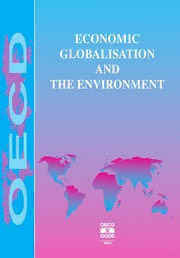
Economic Globalisation and the Environment electronic resource PDF
Preview Economic Globalisation and the Environment electronic resource
ECONOMIC GLOBALISATION AND THE ENVIRONMENT Economic Globalisation and the Environment ORGANISATIONFORECONOMICCO-OPERATIONANDDEVELOPMENT ORGANISATIONFORECONOMICCO-OPERATION ANDDEVELOPMENT PursuanttoArticle1oftheConventionsignedinParison14thDecember1960, andwhichcameintoforceon30thSeptember1961,theOrganisationforEconomic Co-operationandDevelopment(OECD)shallpromotepoliciesdesigned: -toachievethehighestsustainableeconomicgrowthandemploymentandarising standardoflivinginMembercountries,whilemaintainingfinancialstability,and thustocontributetothedevelopmentoftheworldeconomy; -tocontributetosoundeconomicexpansioninMemberaswellasnon-member countriesintheprocessofeconomicdevelopment;and -tocontributetotheexpansionofworldtradeonamultilateral,non-discriminatory basisinaccordancewithinternationalobligations. TheoriginalMembercountriesoftheOECD are Austria,Belgium,Canada, Denmark, France, Germany, Greece, Iceland, Ireland, Italy, Luxembourg, the Netherlands, Norway, Portugal, Spain, Sweden, Switzerland, Turkey, the UnitedKingdomandtheUnitedStates.ThefollowingcountriesbecameMembers subsequentlythroughaccessionatthedatesindicatedhereafter:Japan(28thApril1964), Finland(28thJanuary1969),Australia(7thJune1971),NewZealand(29thMay1973), Mexico (18th May 1994), the Czech Republic (21stDecember 1995), Hungary (7th May 1996), Poland (22nd November 1996) and the Republic of Korea (12thDecember1996).TheCommissionoftheEuropeanCommunitiestakespartinthe workoftheOECD(Article13oftheOECDConvention). Publieenfran5aissousletitre: MONDIALISATIONfiCONOMIQUEETENVIRONNEMENT Reprinted1998 ©OECD1997 Permissiontoreproduceaportionofthisworkfornon-commercialpurposesorclassroomuse shouldbe obtainedthroughCentreFranjaisd'Exploitationdu DroitdeCopie (CFC), 20,ruedesGrandsAugustins,75006Paris,France,foreverycountryexcepttheUnitedStates.In theUnitedStatespermissionshouldbeobtainedthroughtheCopyrightClearanceCentre,Inc. b(eCCmCa)d.eAltlooOthEeCrDappPluibclaitciaotnisonfso,rp2,errmuiessAinodnret-oPraespcraold,uc7e57o7r5trPaanrsilsateCealdleoxrp1a6,rtForfantcheis.bookshould FOREWORD OECDEnvironmentMinistersrecogniseboththechallengesandtheopportu- nitiesthateconomicglobalisationrepresentsfortheenvironment.Thisiswhy, meetinginParisinFebruary1996,theyaskedtheOECDSecretariattoundertake... “athoroughassessmentoftherelationshipsbetweenglobalisationandenviron- mentalpolicies,includingpollutionpreventionandcontrolandthesustainableuse ofnaturalresources,drawingonthefullrangeoftheOrganisation’scapabilitiesand on-goingwork.Theaimistodeepenunderstandingofthelinkagesbetweenenvi- ronmentalpoliciesandstructuralissues,includingcompetitiveness,employment, investment,tradeandtechnology,andoftheextenttowhichpolicydevelopments intheseareaspromotetheinternalisationofenvironmentalcosts.Areportshould bepresentedtotheOECDCouncilMinisterialin1997.” Thispublicationrespondstothatmandate.Itbeginsbyintroducingthemain elementsoftheeconomicglobalisationprocess,includingaframeworkforlinking theseelementstochangesinenvironmentalconditions.Itthenexaminesrecent trendsineachoftheseelements,andhoweachmaybeactuallyaffectingthe environment.TheCounciloftheOECDagreedtothederestrictionofthisreporton May26,1997. TABLEOFCONTENTS Executivesummary 7 Introduction 2 Governance & Competitiveness ‘Pollutionhavens” Foreigninvestment Hade Sectoraleconomicactivities Technology Corporateenvironmentalstrategies FuturedirectionsfortheOECD Economicglobalisationandtheenvironment 1. Introductionandmainissues Economicglobalisation:keycharacteristics Equityissues Globalisationandenvironment:mainissues 2. Governance Market-basedpolicyconvergenceintheglobaleconomy Internationalco-operation 3. Competitiveness Perspectiveofthefirm Perspectiveofindustry Nationalcompetitiveness Internationalcompetitiveness 4. Foreigninvestment EnvironmentandFDI:themacro-economicperspective EnvironmentandFDI:themicro-economicperspective 5. Trade Environmentalimpactsoftradeliberalisation Tradeeffectsofenvironmentalmeasures Integrationofinternationalenvironmentalandtradeagreements ECONOMICGLOBALISATIONANDTHEENVIRONMENT 6. Sectoraleconomicactivities 50 Deregulationandprivatisationinelectricitygeneration 50 Tradeinelectricity 51 EmergenceofIndependentPowerProducers 52 Energy-intensiveindustries 53 Deregulationoffreighttransport 53 Effectsoftradeliberalisationonfreighttransport 56 RegulatoryreformoftransportinCentralandEasternEurope 57 Effectsofagriculturaltradeliberalisation 58 Effectsofreformingagriculturalsupportprogrammes 60 7. Technologychange 63 Economicglobalisationandtechnologicalchange 63 Technologicalchangeandtheenvironment-intensityofproduction .... 64 Economicglobalisationandtheenvironment-intensityoftechnological change 67 8. Corporateenvironmentalstrategies 69 Keystakeholdersincorporateenvironmentalperformance 69 Corporateenvironmentalresponses 72 9. FuturedirectionsfortheOECD 75 Notes 77 References 81 EXECUTIVESUMMARY INTRODUCTION Itisgenerallyagreedthateconomicactivityisbecomingmore“globalised”, butthereislessagreementaboutwhatthiswillactuallymeanfortheaverage citizen.Opinionsarethereforedividedaboutwhetherglobalisationwillultimately begoodorbadoverallforsociety. Thoseinfavourofglobalisationseethebenefitsmostlyineconomicterms (especiallytheincreasedvolumeofworldoutput,incomesandemployment).Those opposed seethe costsprimarilyin socialequityterms (especiallythealtered distributionofworldoutput,incomesandemployment).Asalways,thepolicy challengewillbetofindwaysofrealisingmostofthebenefits,whileavoidingmost ofthecosts. Economicglobalisationisdefinedhereasaprocessinwhichthestructuresof seicvoenlyommiocremairnkteertnsa,titoencahlnoolvoegrietsi,mea.nIdngceonmemrualn,icgaltobiaolnisaptaitotnersnhsoubledcocmonetrpirbougtreesto- theexpansionofworldeconomicoutput(scaleeffects).Itwillalsogenerateshiftsin thecompositionandlocationofproductionandconsumptionactivities(structural effects).Morespecifically,differenttechnologypathswillbepromoted(technology effects),anddifferentproductmixeswillbeproducedandconsumed(product effects). Giventhatsignificantmarketfailuresalreadyoccurwithindomesticeconomies, thesefailureswillbeevenhardertodealwithinamoreglobalisedeconomic context,unlessadequategovernancestructuresareinplacetodealwiththem. Thisbookexploreseconomicglobalisationfromtheparticularperspectiveof theenvironment.Itspremiseisthatglobalisationisalteringthecontextofenviron- mentalproblemsatthelocal,national,regional,andgloballevels.Thisisgenerat- ingnewconcernsaboutthedevelopmentandimplementationofenvironmental policy.Itisalsoopeningupnewopportunitiestopromoteenvironmentalobjectives viathere-orientationofbotheconomicandenvironmentalpolicies. Eachofthescale,structural,technology,andproducteffectsgeneratedbythe globalisation process willalso generate environmentaleffects. Some ofthese ECONOMICGLOBALISATIONANDTHEENVIRONMENT effectsmaybeharmfulfortheenvironment;othersmaybebeneficial.Itisthenet environmentaleffectthatisultimatelyofmostinterest. Economicglobalisationisadifferentconceptfromthatofeconomicgrowth. Globalisationcontributestoeconomicgrowth,butisonlyonecontributor.Popula- tiongrowth,naturalresourceendowments,culturalheritage,etc.alsoplayimpor- tantroles.However,itisdifficulttoquantifypreciselywhatproportionoftotal economicgrowthcanbeattributedspecificallytotheglobalisationprocess.Simi- larly,globalisationwillhaveimpactsonthebroadergoalofsustainabledevelop- ment,butwillagainbeonlyoneofthedeterminantsofprogresstowardthisgoal. Analysingtheenvironmentalconsequencesofglobalisationmustbedoneover alongertimeframethanisrequiredformanyeconomicissues.Thisisessentially becausetheeconomicbenefitsofpolicychangestypicallyappearmuchsoonerthan theenvironmentalbenefitsdo.Adynamicandlong-termapproachtoanalysing theseenvironmentaleffectsisthereforerequired. Thereisconsiderableuncertaintyaboutthelong-termabilityoftheenviron- menttowithstandthepressuresofeventhecurrentlevelofeconomicactivity,let alonethelevelthatmightexistinacontinuouslyglobalisingeconomy.Ontheother hand,globalisationmayalsoopenupopportunitiesforstructuraland/ortechnolog- icalchangesthatcouldhelpinthesearchforsolutionsoverthelonger-term. However,relyingonlong-termpayoffsfromstructural/technologicalimprove- mentswouldbeariskystrategyfromtheenvironmentalperspective.Themain sourceofthisriskisthatthelong-termenvironmentalconsequencesoftoday’s economicbehaviourarepoorlyunderstood.Thisimpliesthattheenvironmental effectsofglobalisationcannotbeviewedstrictlythroughthelensoftoday’seco- nomicinterests.A“precautionaryapproach”isthereforerequired,totakeaccount forthepossibilitythatcurrentperceptionsaboutfutureenvironmentalconditions mayturnouttobewrong(andperhaps,verywrong).Ontheotherhand,theactual levelof“precaution”tobeapplied,aswellastheparticularinstrumentstobeused inimplementingthisapproach,bothneedtobeclearlythoughtout. GOVERNANCE Globalisationwillreducetheabilityofnationalgovernmentstoactunilaterally. Notonlywillthedecisionsofindividualgovernmentshavelessimpactonglobal- isedmarkets,therewillalsobeincreasedpressureongovernmentsnottoimperil thecompetitivepositionoftheirownconstituentsbytakingunilateralaction. Globalisationintensifiespressuresforbotheconomicperformanceandeco- ngeonmciec).pTolhiecideesepinerdiafnfderebnrtoacdoeurnttrhieesletvoelboefcomamrekemtorineteaglriakteio(ne,.gt.hemagrrkeeattercotnhveesre- tendencieswillbe.Inaddition,thelargertheshareofagivencountryinglobal ECONOMICGLOBALISATIONANDTHEENVIRONMENT tradeandcapitalflows,thegreatertheforcesofconvergencewillbetowardthe economicpoliciesofthatnation. OECDcountriesaresimultaneouslythe‘large-market”countries,andthemost highlyintegratedones.Convergenceisthereforelikelytooccurbothwithinthe OECDgroup,aswellasfromthedevelopingcountriestowardtheOECD. The sameforcesleadingto economicpolicyconvergencealsoworkinthe directionofenvironmentalpolicyconvergence.Someenvironmentalproductand productionstandardsarethereforelikelytoconvergearoundan“OECDaverage”,as wellas around industry-wide averages (inthe case ofinternationally-exposed industries). ThisimpliesthatwhattheOECDgroupdoestoaddresstheenvironmental problemsassociatedwithglobalisationwillmatteralot.Inthisregard,OECD “leadership"milbecritical.Italsosuggeststhatthepolicyreactionofanindividual OECDcountrytotheenvironmentalconsequencesofglobalisationislikelytobe “conditioned”mostlybypoliciesadoptedbyitsmajortradingpartners(generally, theotherOECDcountries),ratherthanbypoliciesadoptedintheevelopingones. OECDenvironmentalpolicyinnovationsmaythereforebeconstrainedbythe needtoobtainagreementamongitsmajortradingpartners.Intheabsenceofsuch agreement,environmentalpolicyinnovationsmaytendtoconvergearoundthe statusquo. Unfortunately,maintainingthe status quomaynot be enough to addressthefullrangeofenvironmentalproblemsthatcouldbeassociatedwith globalisation. Market-drivenpolicyconvergencewillreducecompetitivenessproblems,but willnoteliminatethem.Competitivenessissueswillstill“condition”therequired environmentalpolicyresponse.Inaddition,market-basedpolicyresponsesmight notevenbesufficienttoaddresstheecologicalbasesofglobalisation/environment problems.Thisisbecause:i)marketsoftendonotcaptureenvironmentalexternali- tiesatall;ii)evenwheretheydocapturesomeoftheseexternalities,marketsare typicallynotsensitivetolocalecologicalconditions;andHi)countrieshaveeven lessreasontousemarketsasavehicleforinternalisingtransfrontier/globalexter- nalitiesthantheydoforinternalisingdomesticones. Forallthesereasons,someformofgovernmentinterventionwillcontinueto benecessaryinamoreglobalisedeconomy.Thepreciseformthatthisintervention shouldtakewilldependontheparticularcircumstancesathand.Fromtheperspec- tiveofeconomicefficiency,anysuchinterventionshouldbemadeatthesamelevel astheexternalityitself-thus,localexternalitiesshouldgenerallybeaddressedby localresponses;globalonesshouldgenerallybeaddressedatthegloballevel.(Of course,otherpolicygoals besides economicefficiency,such as environmental effectivenessordistributiveissues,areoftenatstake,andcouldalterthisprinciple incertainsituations). . ECONOMICGLOBALISATIONANDTHEENVIRONMENT Inamoreglobalisedeconomy,theboundariesbetweenenvironmentaleffects (externalities)and economiceffects (especiallycompetitiveness problems) will becomelessdistinct.Inaddition,localenvironmentaleffectswillincreasinglyhave internationaleconomicconsequences,andglobalenvironmentalproblemswillgen- eratelocaleconomicimpacts.Thisimpliesthattheremaybenosuchthingasa truly“national”environmentalexternality. Ifthisisso,atleastthreetypesofgovernmentinterventionmaybewarranted: i)nationalpoliciestointernalisetheenvironmentalcostsofthosedomesticexter- nalitieswhichhavenointernationalcompetitivenessimplications;ii)co-operative arrangements with othergovernments on common policies to address those domesticenvironmentalexternalitieswhichdohaveinternationalcompetitiveness implications;andHi)co-operativearrangementswithothergovernmentsoncom- monpoliciesforaddressingtranslfontier/globalenvironmentalexternalities. Thefirstcaseinvolvesonlynationalpolicies,andisnotdealtwithfurtherhere. Thelattertwocasesimplysomeformofmultilateralco-operationaimedatresolv- ingenvironmentalproblems.Thisco-operationwouldhaveseveraldefiningcharac- teristics:i)itwouldnotnecessarilytargetinternationalenvironmentalexternalities; itcouldalsocoverdomesticexternalitieswheresignificantinternationalcompeti- tiveness concerns exist;ii)it would not onlyinvolve environmentalinterests; indeed,thereasonsfortheco-operationinthefirstplacewouldoftenberelatedto competitiveness(i.e.economic)problems,morethantoenvironmentalones;iii)it wouldnotnecessarilyinvolveallcountries.Manyenvironmental(andcompetitive- ness)problemshavemorerelevanceattheregionalscalethantheydoattheglobal level.Evenintheparticularcaseofglobalenvironmentalissues,internationalco- operationmightbemoreefficientifitwereorganisedatthesub-globallevel,given thesignificanttransactioncoststhatcanbeassociatedwithinvolvingalarger numberofcountries. Internationalco-operationofthetypesuggestedherecouldtakevariousforms (e.gvoluntaryactions,codesofconduct,guidelines,formalagreements,etc.).Afew areasinwhichanyorallofthesedifferentformsmightbeconsideredforfuture initiativesbytheOECDinclude: • Newopportunitiesmayexistforreducingglobalisation-inducedenvironmen- talproblemsinthecontextofregionaleconomicgroupings,suchasAPEC, EU,NAFTAtheOECDitself,etc.Thesearrangementswouldbuildonthe strengthofthe consensus-buildingapproach,andwould explicitlywork towardtheintegrationofcompetitivenessandenvironmentalissues. Opportunitiesprobablyexistforimprovedintegrationofthecompetitive- ness/financialandenvironmentalobjectivesofkeyinternationalorganisa- 10 tions(UNEP,WorldBank,EBRD,etc.).
